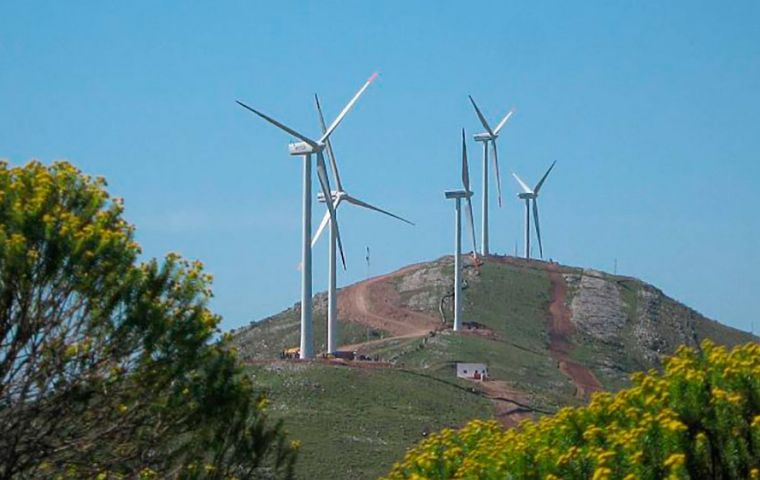MercoPress. South Atlantic News Agency
Colombia, Mexico, Trinidad Tobago, Uruguay teams, winners of IDB Development Initiative
 Uruguay grew its wind power capacity from 1% to 31% of its electricity mix in just one decade.
Uruguay grew its wind power capacity from 1% to 31% of its electricity mix in just one decade. The Inter-American Development Bank (IDB) announced the four winners of the fifth Superheroes of Development contest, which rewards creative and innovative solutions used in development projects financed by the IDB, IDB Invest and IDB Lab (IDB Group) in Latin America and the Caribbean.
The initiative is organized by the BID-Academy, the IDB Group’s centralized knowledge platform. The aim of the contest is to enhance the performance of the bank’s projects by spotlighting the initiatives that best respond to today’s changing realities and offer timely lessons that other teams can apply.
This year, there were 77 proposals from 23 countries in our region. A panel of senior managers at the IDB Group selected the four winners, two in each of the contest’s two categories: projects currently being implemented and projects that ended after January 2016.
Lorena Rodríguez Bu, Acting Manager of the Knowledge, Innovation and Communication Sector, said, “A fundamental dynamic at the IDB is sharing what we learn so one project can adopt another’s best practices. That is why we created Superheroes of Development. It is a contest, yes, but most of all, it is a knowledge platform.”
This year’s winners are:
Change-driven success: a story of pandemic adaptation and action (Colombia)
Implementing unit: Program for Institutional Strengthening of the Office of the Comptroller General.
In early 2020, the Office of the Comptroller General of Colombia was making strides towards more effective and efficient fiscal control. However, the pandemic threatened the progress of the program, which at the time had 27 procurement processes underway. The program overcame difficulties and digitalized 100% of its activities, improved implementation percentages, and convinced officials to adopt new technology.
No one was left behind, no one (Mexico) Implementing unit: Center for Research and Higher Education in Social Anthropology
When schools closed during the COVID-19 pandemic, children’s academic progress suffered. Only 27 of every 100 children from lower socioeconomic backgrounds were able to solve simple math problems. The State of Tabasco launched a remote tutoring program for students ages 9 to 14 to help them catch up in math. This project was first implemented in El Salvador, and then replicated in Guanajuato, Mexico, and Guatemala. All students needed was a telephone, an antiquated but useful tool in places with no internet connection. The program engaged teachers and students at home, which helped make it a success.
Green infrastructure for climate resilience in the Caribbean with the support of IDB Lab (Trinidad and Tobago) Counterpart: IAMovement
Every year, erosion, mudslides, and floods inflict considerable social, financial, and environmental damage on communities. In past decades, a nature-based solution used to protect Trinidad and Tobago from these disasters: vetiver. This species of bunchgrass sends down roots as deep as three meters into the soil, preventing erosion, mudslides, and floods. The project rediscovered this effective method, enabling a new generation of resilience.
Green investments for all with IDB Invest support (Uruguay) Client: Areaflin
Uruguay sets the bar for the energy transition in the region. It grew its wind power capacity from 1% to 31% of its electricity mix in just one decade. Before the rise of renewables, Uruguay largely obtained its electricity from hydroelectric dams, fossil fuels and imports from neighboring countries. By building the Valentines wind-farm with the support of IDB Invest, it was able to transform its energy supply. When the construction needed more investments, it proposed a unique solution inviting citizens to participate as minority shareholders. This solution was made possible by Redpagos, an extensive network for paying and collecting money with 400 locations throughout the country.




Top Comments
Disclaimer & comment rulesCommenting for this story is now closed.
If you have a Facebook account, become a fan and comment on our Facebook Page!